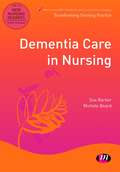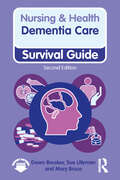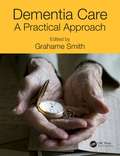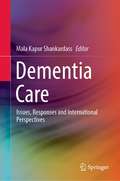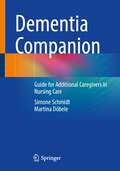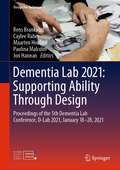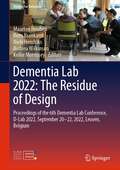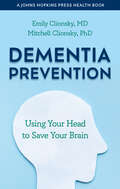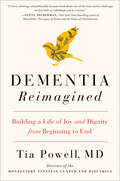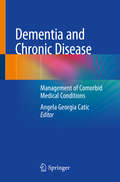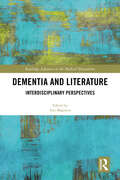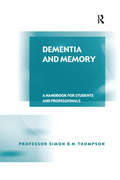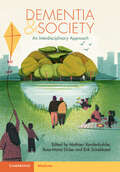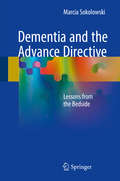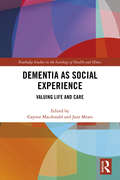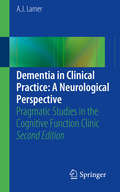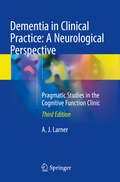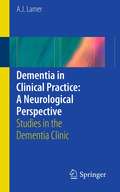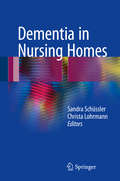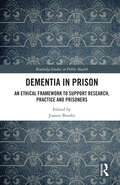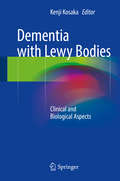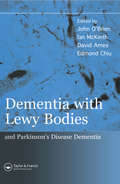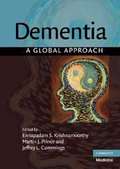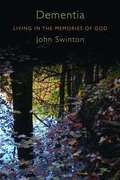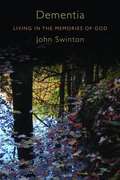- Table View
- List View
Dementia Care in Nursing (Transforming Nursing Practice)
by Sue Barker Mrs Michele BoardDementia care presents a huge challenge to health and social care both now and in the future. The number of those in the UK with dementia is expected to increase to 1.4 million in the next 30 years. Regardless of the field of nursing, all nurses need to understand the experiences of a person with dementia and the issues related to their care. This book provides an introduction to dementia care for nursing students with an emphasis on humanizing care. Real life case studies show the person behind the patient and explore the ethical dilemmas that a nurse may face.
Dementia Care, 2nd ed (Nursing and Health Survival Guides)
by Dawn Brooker Sue Lillyman Mary BruceIdeal for quick reference, this pocket-sized guide puts all the crucial information on caring for patients with dementia at your fingertips. Evidence-based and fully updated for this second edition, it includes all you need to know on: person-centred dementia care; dementia-friendly environments; working with families as partners; communication and managing behaviour; pain assessment; nutrition and medication; advanced care plans; and much more ... All health and social care professionals involved in the care of dementia patients will find this book a valuable resource, while it is an essential guide for students on placement in this area.
Dementia Care: A Practical Approach
by Grahame SmithDementia is both a personal and a societal challenge. The goal of Dementia Care: A Practical Approach is to focus on how practitioners can meet this challenge with hope and compassion, thereby enabling those with dementia to live well. The book takes a ‘strengths approach’ with an emphasis on exploring sustainable strategies. Its content is underpinned by relevant policies and strategies and explicitly links to research evidence while always valuing the voices of those living with dementia. Covering various dementia strategies, the book provides a clear vision of dementia care delivery and is mapped to the Curriculum for UK Dementia Education. For health care students, the content is also mapped to the requirements of the Health and Care Professions Council and the Nursing and Midwifery Council. The book includes experiences of people living with dementia, practical examples, self-assessment questions, and key point summaries. It is a valuable resource to practitioners, informal caregivers, families, individuals with dementia or those wanting to know more about the subject.
Dementia Care: Issues, Responses and International Perspectives
by Mala Kapur ShankardassThis book discusses the contemporary medico-social, psychological, legal, and therapeutic concerns related to people affected by dementia as a patient or as a caregiver. It provides global emerging responses to dementia. It highlights different dimensions of dementia in terms of issues, concerns, policies, and strategies all around the globe. The contributing authors present issues from cross-cultural education visible in dementia studies and discuss the power of music, art therapy, artistic collaborations, and many innovative practices in dealing with dementia. Written by international specialists from various disciplines, the chapters include challenges and emerging issues related to the role of family caregivers, the concern with vulnerability to elder abuse and neglect, and the role of technology in dementia care. The book provides a diverse perspective to dementia care not covered in such a broad way by any other books on the topic. This book is intended for academics from a wide range of fields such as sociology, geriatrics, community medicine, public health, clinical psychology, social work all of which, collectively, bear on the problem and the solutions for better dementia care.
Dementia Companion: Guide for Additional Caregivers in Nursing Care
by Simone Schmidt Martina DöbeleThe successful book for additional caregivers now in an updated 4th edition. Caregivers take on an important task in the care and accompaniment of people with dementia and contribute to the improvement of the individual living situation. This handbook supports not only everyday caregivers, but also volunteers and professional caregivers in their meaningful and demanding task. All the important basics are explained in an understandable way to help people with dementia or mental illness to cope with their everyday lives. Learn more about: Disease theory, everyday life design and employment offers, care quality, first aid in difficult situations, housekeeping. The book is coordinated with all contents of the advanced training for additional caregivers according to § 87b SGB XI. In addition, there are tips and checklists for the internship, for reflection and self-care. For caregivers in training and practice, and for all people who accompany people with dementia or limited everyday competence.
Dementia Lab 2021: Proceedings of the 5th Dementia Lab Conference, D-Lab 2021, January 18–28, 2021 (Design For Inclusion #2)
by Rens Brankaert Caylee Raber Maarten Houben Paulina Malcolm Jon HannanThis book gathers revised and selected contributions to the 5th Dementia Lab Conference, D-Lab 2021, organized online on January 18-28, 2021, from the Emily Carr University of Art + Design, Vancouver, Canada. It describes original strategies in which design or creative methods have been shown to uncover, support and enhance the abilities of people living with dementia. Papers report on new ideas and findings relating to three main themes: engagement, empowerment and identity. They cover: ethics of inclusion and solutions for shifting the culture of care to be focused on both personal independence and reconnecting with the community; new ways of designing with people living with dementia; strategies for breaking negative stereotypes and preconceived opinions; and approaches to retaining personhood and dignity. Offering a timely source of information on new design and creative methods to a broad community of industrial, communication, interactive and inclusive designers, this book is also meant to address and inspire various stakeholders and organizations in dementia care.
Dementia Lab 2022: Proceedings of the 6th Dementia Lab Conference, D-Lab 2022, September 20–22, 2022, Leuven, Belgium (Design For Inclusion #3)
by Rens Brankaert Maarten Houben Niels Hendriks Andrea Wilkinson Kellie MorrisseyThis book gathers the revised and selected contributions to the 6th Dementia Lab Conference, D-Lab 2022, held on September 20-22, 2022, in Leuven. It describes original and innovative research on how design can contribute to the quality of life of people with dementia, their loved ones, and caregivers. The papers highlight the value of participation within design, analyzing it at three levels: personal, product, and organizational. The presented ideas and findings address ‘The Residue of Design’ and go beyond the initial impact of the design itself by looking at what benefits design research brings for people with dementia. The papers cover topics such as the development of creative design methods to foster participation and engagement from people with dementia, evaluation studies or critical reflections that reveal the impact of products and the built environment in dementia care, and raising awareness and countering stigma in societal views on dementia.
Dementia Prevention: Using Your Head to Save Your Brain (A Johns Hopkins Press Health Book)
by Emily Clionsky Mitchell ClionskyWorried about memory loss and dementia risk? This new book will show you easy-to-follow steps to keep your brain healthy.Emily Clionsky, MD, and Mitchell Clionsky, PhD, are a physician and neuropsychologist couple who have cared for their own parents with dementia, created a test used by doctors to measure cognitive function, and treated more than 25,000 patients with cognitive impairment. In Dementia Prevention, they combine the most current scientific findings about Alzheimer's disease and other dementias with their experience to present a practical guide that empowers you to improve your brain's future. This book skips the fads, the unsupported claims of advertised products, and fringe theories. Instead, the authors guide you through a science-based tour of dementia, including how your brain works and how its function is affected by everything from blood circulation and blood pressure to sugar levels, medications, vision, and hearing. You will learn how your activity level, weight, habits, mental outlook, and social engagement may affect your likelihood of developing dementia. Dementia Prevention provides a dementia risk checklist to better understand your personal risk profile to help you on your journey. The authors' training and experience as behavioral scientists will help you set better goals, identify roadblocks to success, and overcome these obstacles. Forgetfulness and confusion are not an inevitable part of growing older—you can make changes to keep your brain working well into your 70s and beyond. From how you breathe while you sleep to what you do socially and physically every day, Dementia Prevention will give you practical—and sometimes surprising—methods for you to protect your brain.
Dementia Reimagined: Building a Life of Joy and Dignity from Beginning to End
by Tia PowellThe cultural and medical history of dementia and Alzheimer's disease by a leading psychiatrist and bioethicist who urges us to turn our focus from cure to care.Despite being a physician and a bioethicist, Tia Powell wasn't prepared to address the challenges she faced when her grandmother, and then her mother, were diagnosed with dementia--not to mention confronting the hard truth that her own odds aren't great. In the U.S., 10,000 baby boomers turn 65 every day; by the time a person reaches 85, their chances of having dementia approach 50 percent. And the truth is, there is no cure, and none coming soon, despite the perpetual promises by pharmaceutical companies that they are just one more expensive study away from a pill. Dr. Powell's goal is to move the conversation away from an exclusive focus on cure to a genuine appreciation of care--what we can do for those who have dementia, and how to keep life meaningful and even joyful. Reimagining Dementia is a moving combination of medicine and memoir, peeling back the untold history of dementia, from the story of Solomon Fuller, a black doctor whose research at the turn of the twentieth century anticipated important aspects of what we know about dementia today, to what has been gained and lost with the recent bonanza of funding for Alzheimer's at the expense of other forms of the disease. In demystifying dementia, Dr. Powell helps us understand it with clearer eyes, from the point of view of both physician and caregiver. Ultimately, she wants us all to know that dementia is not only about loss--it's also about the preservation of dignity and hope.
Dementia and Chronic Disease: Management of Comorbid Medical Conditions
by Angela Georgia CaticThis book is designed to guide all physicians in long-term care, in-, and outpatient settings who work with elders with co-current dementia and medical comorbidities. Chapters cover a wide range of challenging topics, including epidemiological data, evaluation and management techniques to optimize physical and cognitive function in patients with dementia, safety measures, and nonpharmacologic measures to support cognition. Chapters also discuss the unique aspects of managing the most common chronic diseases and the management of musculoskeletal pain in elders with dementia. Except for the introductory chapter, each chapter will include a case vignette to highlight some of the primary challenges of management of the particular chronic disease/condition in elders with dementia, making this an accessible and highly practical tool for medical professionals of all backgrounds.Written by experts in the field, Dementia and Chronic Disease is an excellent resource for all medical professionals treating patients with dementia, including geriatricians, family medicine physicians, social workers, nurses, hospitalists, and all others.
Dementia and Literature: Interdisciplinary Perspectives (Routledge Advances in the Medical Humanities)
by Tess MaginessDementia is an urgent global concern, often termed a widespread ‘problem’, ‘tragedy’ or ‘burden’ and a subject best addressed by health and social policy and practice. However, creative writers can offer powerful and imaginative insights into the experience of dementia across cultures and over time. This cross-disciplinary volume explores how engaging with dementia through its myriad literary representations can help to deepen and humanise attitudes to people living with the condition. Offering and interrogating a wide array of perspectives about how dementia might be ‘imagined’, this book allows us to see how different ways of being can inflect one another. By drawing on the ‘lived’ experience of the individual unique person and their loved ones, literature can contribute to a deeper and more compassionate and more liberating attitude to a phenomenon that is both natural and unnatural. Novels, plays and stories reveal a rich panoply of responses ranging from the tragic to the comic, allowing us to understand that people with dementia often offer us models of humour, courage and resilience, and carers can also embody a range of responses from rigidity to compassion. Dementia and Literature problematises the subject of dementia, encouraging us all to question our own hegemonies critically and creatively. Drawing on literary studies, cultural studies, education, clinical psychology, psychiatry, nursing and gerontology, this book is a fascinating contribution to the emerging area of the medical and health humanities. The book will be of interest to those living with dementia and their caregivers as well as to the academic community and policy makers.
Dementia and Memory: A Handbook for Students and Professionals
by Simon B. ThompsonDementia and related diseases are likely to affect at least four in every hundred 75-79 year olds in the developed world over the coming years. Faced with an expanding older population, it is crucial that we develop our understanding of how to treat people suffering from such conditions. This accessible book provides extensive information on the different types of dementia and on memory problems more generally. It includes detailed coverage of how to alleviate memory problems and discussion on issues such as ageism. For the student reader, there are descriptions and discussions of key topics as well as practical step-by-step guidance. The book includes a memory test as well as a comprehensive list of useful addresses and suggestions for further reading. This book will be an invaluable resource for the trained healthcare and medical professional and for the student reader.
Dementia and Society
by Erik Schokkaert Rose-Marie Dröes Mathieu VandenbulckeDementia is increasingly being recognised as a public health priority and poses one of the largest challenges we face as a society. At the same time, there is a growing awareness that the quest for a cure for Alzheimer's disease and other causes of dementia needs to be complemented by efforts to improve the lives of people with dementia. To gain a better understanding of dementia and of how to organize dementia care, there is a need to bring together insights from many different disciplines. Filling this knowledge gap, this book provides an integrated view on dementia resulting from extensive discussions between world experts from different fields, including medicine, social psychology, nursing, economics and literary studies. Working towards a development of integrative policies focused on social inclusion and quality of life, Dementia and Society reminds the reader that a better future for persons with dementia is a collective responsibility.
Dementia and the Advance Directive: Lessons From The Bedside
by Marcia SokolowskiThis unique title offers a novel exploration into the world of advance directives for patients with dementia. Based on real life ethics consultations the expert author has undertaken, the cases depict fascinating and challenging moral issues arising in a variety of healthcare facilities. The dynamics of the interdisciplinary health care teams of these patients, along with the dynamics of the families who are grappling to best serve their loved ones, are outlined and assessed; and the role each player’s personal histories have on the ethical issues and their resolution in real life are explored. Following each case study, the author applies a range of concepts introduced in the beginning of the book to the relevant case study, thus integrating theory with a case-based approach. A user-friendly question-and-answer format provides a thought provoking and accessible learning experience for readers. Dementia and the Advance Directive: Lessons from the Bedside tackles complicated and realistic healthcare scenarios and offers an invaluable addition to the literature on advance directives.
Dementia as Social Experience: Valuing Life and Care
by Gaynor Macdonald Jane MearsA diagnosis of dementia changes the ways people engage with each other – for those living with dementia, as well their families, caregivers, friends, health professionals, neighbours, shopkeepers and the community. Medical understandings, necessary as they are, provide no insights into how we may all live good lives with dementia. This innovative volume brings together an interdisciplinary group of researchers and practitioners to focus on dementia as lived experience. It foregrounds dementia’s social, moral, political and economic dimensions, investigating the challenges of reframing the dementia experience for all involved. Part I critiques the stigmas, the negativity, language and fears often associated with a dementia diagnosis, challenging debilitating representations and examining ways to tackle these. Part II examines proactive practices that can support better long-term outcomes for those living with dementia. Part III looks at the relational aspects of dementia care, acknowledging and going beyond the notion of person-centred care. Collectively, these contributions highlight the social and relational change required to enhance life for those with dementia and those who care for them. Engaging in a critical conversation around personhood and social value, this book examines the wider social contexts within which dementia care takes place. It calls for social change, and looks for inspiration to the growing movement for relational care and the caring society. Dementia as Social Experience is important reading for all those people who, in various ways, are living with dementia, as well as for those working in this area as clinicians, researcher and carers.
Dementia in Clinical Practice: Pragmatic Studies in the Cognitive Function Clinic
by A. J. LarnerThis concise, pragmatic, pocket-sized book addresses neurological contributions to the diagnosis and management of dementia through a longitudinal examination of the work undertaken in a dedicated neurological dementia clinic. <P><P> It covers the use of cognitive and non-cognitive screening instruments and their diagnostic utility and the use of other diagnostic investigations: neuroimaging, neurophysiology and neuropathology. The diagnostic mix is discussed in terms of both neuropsychological syndromes and neurological diagnoses, as is the use of conventional treatments for dementia and the impact of national directives (e.g. NICE, National Dementia Strategy) on day-to-day clinical practice. <P> Dementia in Clinical Practice: A Neurological Perspective, Second Edition is an illustrated, practical resource for medical professionals involved in the assessment and management of dementia patients. It is of particular benefit to neurologists, psychiatrists, geriatricians, primary care practitioners and those working in the fields of neuropsychology, psychology, occupational therapy, speech and language therapy and nursing.
Dementia in Clinical Practice: Pragmatic Studies in the Cognitive Function Clinic
by A. J. LarnerThis expanded, updated third edition summarizes the pragmatic diagnostic accuracy studies of neurological signs and cognitive and non-cognitive screening instruments undertaken in the author’s clinic in the context of day-to-day practice involving patients with cognitive disorders including dementia. A new chapter devoted to comparing and combining instruments is included, and illustrative case studies have been included where relevant. Dementia in Clinical Practice: A Neurological Perspective, Third Edition is a practical resource for medical professionals involved in the assessment and management of patients with dementia and cognitive disorders. It may be of particular interest to neurologists, psychiatrists, geriatricians, primary care practitioners and those working with patients with cognitive impairment in the fields of neuropsychology, psychology, occupational therapy, speech and language therapy and nursing.
Dementia in Clinical Practice: Studies in the Dementia Clinic
by A. J. LarnerDementia in Clinical Practice: A Neurological Perspective addresses neurological contributions to the diagnosis and management of dementia through a longitudinal examination of the work undertaken in dedicated neurological dementia clinics. This concise, pragmatic handbook covers: The use of cognitive screening instruments and their diagnostic utility. The use of non-cognitive (functional, behavioural, neurovegetative) screening instruments and their diagnostic utility. The use of other diagnostic investigations: neuroimaging, neurophysiology, neuropathology. The diagnostic mix in terms of both neuropsychological syndromes and neurological diagnoses. The use of conventional treatments for dementia. The impact of national directives (e.g. NICE, National Dementia Strategy) on day-to-day clinical practice. Dementia in Clinical Practice: A Neurological Perspective is an illustrated, practical resource for medical professionals involved in the assessment and management of dementia patients. It is of particular benefit to neurologists, psychiatrists, geriatricians, primary care practitioners and those working in the fields of neuropsychology, psychology, occupational therapy, speech and language therapy and nursing.
Dementia in Nursing Homes
by Sandra Schüssler Christa LohrmannWritten by world-renowned experts, this book discusses the latest advances in the field of dementia in nursing homes. The provided topics and its findings are based on their survey and on a scientific literature review. Dementia is spreading worldwide, placing a burden on healthcare systems and caregivers, as well as those affected. With increasing and complex care needs, nursing home admission is often necessary. Globally, over half of nursing home residents suffer from dementia. As such this book will appeal to professional nurses, nursing scientists, nursing students, other healthcare professionals and to a wide readership providing a valuable resource for those working in nursing homes, as well as researchers in the field.
Dementia in Prison: An Ethical Framework to Support Research, Practice and Prisoners
by Joanne BrookeThis innovative volume exposes dementia as a condition that the aging prison population is increasingly facing. Going beyond exploring the need to understand dementia within prison populations, it argues that healthcare workers and prison staff must ensure that prisoners developing dementia during their sentence are identified and supported. Dementia in Prison covers three key areas: • Healthcare services in prison settings and how these affect the rapidly aging prison population, • The human rights of prisoners with dementia, alongside the ethics of healthcare in this environment, • The current state of support for prisoners with dementia and any recommendations for future assessment, diagnosis, and policies. This provocative book will be invaluable to scholars in the fields of public health, criminology and medical sociology as well as nurses and prison staff.
Dementia with Lewy Bodies
by Kenji KosakaThis book describes biological and clinical aspects of dementia with Lewy bodies (DLB), one of the most common types of progressive dementia, although in most cases the cause is unknown. The editor has made a major contribution to the understanding of the disease since he first reported DLB in 1976. Written by renowned experts in the field, the book discusses not only diagnostic criteria and clinical symptoms of DLB but also various imaging modalities and biological markers such as alpha-synuclein, which are useful for diagnosis of DLB. Dementia with Lewy Bodies is aimed at psychiatrists, neurologists, and researchers who are interested in DLB.
Dementia with Lewy Bodies: and Parkinson's Disease Dementia
by John O'Brien David Ames Ian McKeithFilling a noticeable gap in the market for a new text solely focused on Dementia with Lewy Bodies, this book discusses cutting-edge topics covering the condition from diagnosis to management, as well as what is known about the neurobiological changes involved. With huge progress having been made over the last decade in terms of the disorder
Dementia: A Global Approach
by Ennapadam S. Krishnamoorthy Martin J. Prince Jeffrey L. Cummings"Growth in the incidence of dementia presents major challenges to global healthcare systems. As the burden of dementia in non-Western cultures grows, developing nations are expected to overtake developed nations in terms of dementia prevalence. Insights from developing nations and transcultural considerations are, nevertheless, neglected in the published literature. Dementia: A Global Approach fills this gap by integrating contemporary cross-cultural knowledge about dementia. Each section reviews the literature from the published, predominantly Western, perspective, contrasting it with empirical knowledge from non-Western cultures. Covering major clinical, epidemiological and scientific areas of interest, detailed consideration is also given to care-giving models across the world and management of patients who have migrated between regions. Enriched with personal insights from clinical experts across the globe, this is a key text for neurologists, geriatricians, psychiatrists, psychologists, epidemiologists and all those responsible for managing provisions of dementia services"--Provided by publisher.
Dementia: Living In The Memories Of God
by John Swinton<P>In this book John Swinton develops a practical theology of dementia for caregivers, people with dementia, ministers, hospital chaplains, and medical practitioners as he explores two primary questions: <br>Who am I when I've forgotten who I am? <br>What does it mean to love God and be loved by God when I have forgotten who God is? <P>Offering compassionate and carefully considered theological and pastoral responses to dementia and forgetfulness, Swinton's Dementia: Living in the Memories of God redefines dementia in light of the transformative counter story that is the gospel.
Dementia: Living in the Memories of God
by John SwintonIn this book John Swinton develops a practical theology of dementia for caregivers, people with dementia, ministers, hospital chaplains, and medical practitioners as he explores two primary questions: Who am I when I've forgotten who I am? What does it mean to love God and be loved by God when I have forgotten who God is? Offering compassionate and carefully considered theological and pastoral responses to dementia and forgetfulness, Swinton's Dementia: Living in the Memories of God redefines dementia in light of the transformative counter story that is the gospel.
